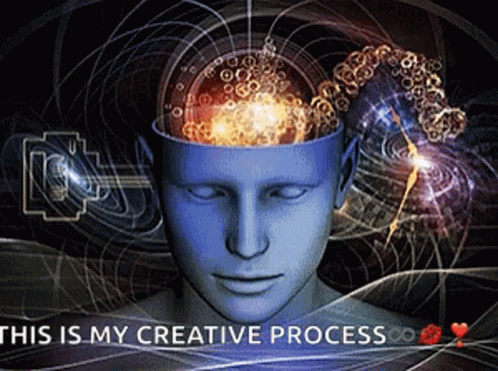
Has this ever happened to you?
You are in the shower taking your bath, suddenly, like a dam that is broken, billions of ideas begin to flood your mind. You feel like taking a pen and start writing immediately. But you are in the shower.
You tell yourself that once you leave the shower, you will go and write down those ideas. 2 days later, you are in the shower again, you remember that 2 days ago you had so many ideas you wanted to write about but when you left the shower, all the ideas left you.
You tell yourself that you will take another conscious effort to write, so after your shower, you sit in front of your computer, ready to write a whole book. 30mins later, you are still staring at a blank screen. 2 hrs later, you have given up and you are scrolling on instagram and laughing to a skit made by a popular skit maker.
Writer's Block

If this has happened to you in one form or the other, you have experienced the proverbial "writers block". It is a form of paralysis that prevents the imagination of a person from coming up with creative things to write about.
I am not writing about writer's block because I have writer's block. I am writing about it because it can really be a very distressing position to be in.
Understanding Writer's block.
But what if you and I do not have to battle this mortal enemy of creativity. What if there is a way to "know thy enemy" so that we can vanquish him once and for all?
It would begin with understanding what parts of the brain are important for the process of creating the masterpiece that any good writer produces.
The Creative Brain

Let us examine two major parts of the brain that are important in creativity in relation to writer's block.
Prefrontal Cortex-
This is a part of the brain that is responsible for what we know as executive functioning. Things like critical decision making, focus, planning, etc are controlled by this part of the brain. When there is an overwhelming amount of data to process especially in states of self doubt, it becomes difficult for this part of the brain to do it's job.
It can become overactive with so many thoughts making it difficult to focus and organize the thoughts. Conditions of stress are known to be causative factors for this experience.
Default Mode Network-
There are regions of the brain that are collectively known as the default mode network. They are active when a person is at rest or engaged in tasks that are internally focused... like imaginative details, day dreaming, self-reflection.
It is the part of the brain that is active for fiction writing and novel creations. It is the part of the brain that combines information from different sources to come up with something completely new and fresh.
In writer's block, synthesizing new information becomes difficult, often resulting the phenomenon of staring at a blank screen or piece of paper for hours on end.
Anxiety and writers block.
There is that part of a writer that is anxious about what he is about to create. Would it be good? would it be something worth reading? This anxiety can sometimes become so crippling that you find a person writing and erasing one line for hours on end.
It is the picture of a person sitting at his desk to write, with a pile of rumpled paper at the side because he can never settle on the right way to phrase the opening sentence of his article.
Practical Tools for Overcoming Writer's block.

Activate your Default Mode Network.(DMN)
The DMN is active when you day dream, it is active when you are not actively engaging with external stimuli. Here are a few tips that can help to activate it and strengthen the brain connections in those areas.
- Engage in mind-wandering or daydreaming- allowing your mind to wander can help stimulate the connection between different things in your mind. Is there a connection between space travel and religion? Is there a connection between dinosaurs and the price of rice in the market today? Maybe, maybe not... maybe the connection is fictional, maybe it is real...
You can only get to strengthen your connection of ideas through engaging the DMN. You do that by taking breaks that allow your mind to wander, taking walks, showering or meditation. This way you free up your mind to engage in spontaneous creativity.
Use the pomodoro technique of 25minutes of focused work followed by 5 mins break to prevent mental fatigue and promote a mental balance necessary for creative thinking.
A change of scenery or environment can be the necessary stimuli for the brain to increase the activity of the DMN. Instead of sitting at your desk to write, why not go to a park, or a cafe or a restaurant, you will be surprised the amount of inspiration you would get from changing the environment.
Engage in physical exercise
When you exercise, your heart pumps faster and there is increased blood flow to your brain centres. This has been shown to be beneficial to the brain process called neuroplasticity( neurons firing ad wiring in a different way than they have been doing before). It helps to break the mental tension that enables your creative juices to flow.
Task Chunking
Breaking down what need to write, especially if you have a boat load of information to process can help with ensuring that they are structured enough for you to be able to work through them.
It means that your brain is able to do more accurately, tasks that are in small bits and pieces.
Start Writing/Creating
Many people want to have the perfect title or the perfect first paragraph in other to begin their writing. Who says you cannot start from the middle and move to the beginning? Who says you cannot start from the end and go to the beginning?
Start from somewhere and develop the theme forward, backwards, sideways, anyway you can. Don't wait for the perfect inspiration, it doesn't exist.
There are many other tips to help break through writer's block, but I do not want this article to be too long. I would get to explore them in other articles.
Conclusion.
Writer's block is real. it doesn't mean that there is something wrong with your brain or with you as a person. it just means that you need to have a different approach to things. Look at things a bit differently. Looking forward to your super inspired piece after reading this.
Thank you for reading.

I am Covenant, a Medical Doctor with a passion for holistic medicine-( fancy word for treating a patient as an individual and not just addressing their symptoms).
My focus lies in the deep connection between mental health and overall wellbeing, and I create content across various medical topics with an emphasis on mental health. Follow me for insights into holistic medicine and approaches to health and wellness.
Visit my blog today to catchup on exciting subjects.
